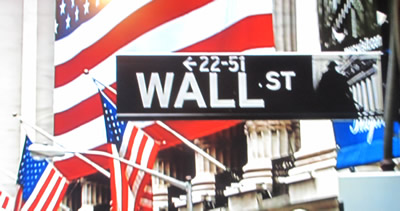Wall Street Versus Main Street!
Stock-Markets / Market Regulation Jun 25, 2009 - 04:54 PM GMTBy: Sy_Harding
 The Administration has provided Congress with a proposed overhaul of financial industry regulations that is sweeping in its coverage to say the least, the most serious attempt to protect investors since the 1930’s, but guaranteed to have Wall Street and its powerful friends taking up arms against it.
The Administration has provided Congress with a proposed overhaul of financial industry regulations that is sweeping in its coverage to say the least, the most serious attempt to protect investors since the 1930’s, but guaranteed to have Wall Street and its powerful friends taking up arms against it.
 And there’s more than enough in it to have Wall Street fighting back - much as they did with the reforms proposed in the 1930’s, after the 1929 crash.
And there’s more than enough in it to have Wall Street fighting back - much as they did with the reforms proposed in the 1930’s, after the 1929 crash.
(Before the Securities and Exchange Act was finally passed in 1934, Sam Rayburn, Speaker of the House at the time, said that Richard Whitney, president of the NYSE at the time, mounted “the most powerful lobbying effort ever organized against a bill.”) The bill did pass, but in a watered-down version, which will no doubt also be the outcome this time.
But if only part of the proposed overhaul survives to become law, it could be the most important improvements in investor protection ever.
Just to touch on a few of the many proposed changes:
Hedge funds, private-equity funds, and venture-capital firms would be required to register with the SEC, keep SEC approved records, and make periodic disclosure reports in much the same manner that has been required of mutual funds and money-management firms for decades. The disclosures would include their debt levels and the amount of leverage they are employing in their strategies.
It would subject any financial firm large enough to be a risk to the financial system to a greater degree of regulatory oversight than others, including periodic ‘stress tests’.
It would replace the Office of Thrift Supervision with a National Bank Supervisory Agency that would have the power to oversee Federal Reserve branch banks and U.S. branches of foreign banks.
It would bring markets for over-the-counter derivatives under the regulatory umbrella, more seriously regulate derivatives dealers, and force derivative trades to be executed in public view, such as on exchanges. It would also provide controls to protect “unsophisticated parties” from investing in derivatives “inappropriately”.
A new Consumer Financial Protection Agency would be created, with authority over consumer-oriented financial products, which are now only loosely regulated, including mortgages and credit-card offerings. The new agency would also have “a leading role” in informing and educating consumers, to make sure they are aware of the types of risks and pitfalls in various financial areas.
Brokers and non-registered financial planners providing investment recommendations to customers would be held to the same ‘fiduciary’ standards as registered money-managers and financial advisors. (A fiduciary is required to place his client’s interests ahead of his own, a standard not currently required of brokers unless they are also registered with the SEC as a financial advisor). That would likely result in changes in the types of products offered by brokerage firms and mutual funds, as well as the methods by which brokers and commission-based financial planners are compensated. It would be difficult for them to put a client in a front-end load mutual fund or annuity for which they receive part of the load as a sales commission, if similar and suitable no-load funds and annuities are available at lower cost for the client. It would also be more difficult to ‘churn’ client accounts to produce more commission income. The penalties are potentially severe. A fiduciary who violates fiduciary duties when involved with the assets of others can be sued not only for any financial damages, but also punitive damages.
One section of the proposals likely to run into particularly serious opposition in Congress is the proposed broad expansion of the authority of the Federal Reserve. The agency that could have done the most to prevent the stock market bubble in the late 1990’s (then Federal Reserve Chairman Greenspan even coining the phrase “irrational exuberance” to describe what was going on, but doing nothing about it), and the housing bubble in 2006, would be given substantial additional responsibilities to control the ‘too big to fail’ financial institutions?
But don’t expect regulatory reform of the financial industry anytime soon anyway, or for the final bill to look anything like the proposals. There will be months of lobbying, angry debates, compromises, and concessions. Then we’ll see what comes out the other end of the process.
However, given the mood of the country toward Wall Street and the financial industry, and the serious damage done to so many, some good things could eventually come out of the proposals that will provide more investor protection in the future.
Sy Harding publishes the financial website www.StreetSmartReport.com and a free daily market blog at www.SyHardingblog.com.
Disclaimer: The above is a matter of opinion provided for general information purposes only and is not intended as investment advice. Information and analysis above are derived from sources and utilising methods believed to be reliable, but we cannot accept responsibility for any losses you may incur as a result of this analysis. Individuals should consult with their personal financial advisors.
© 2005-2022 http://www.MarketOracle.co.uk - The Market Oracle is a FREE Daily Financial Markets Analysis & Forecasting online publication.



